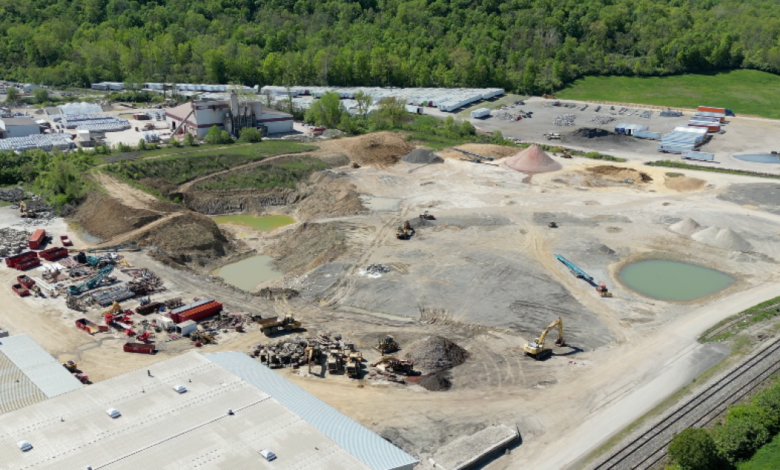
NEWTOWN, Ohio — Nearly eight months after Evans Landscaping owner Doug Evans signed a $550,000 settlement with the state over environmental violations, cleanup at one site hasn’t begun and groundwater testing from another site revealed high levels of arsenic.
Ohio Attorney General Dave Yost sued Evans in March 2021 at the request of Hamilton County and the Ohio EPA, after more than two decades of violations. Inspectors cited “reoccurring problems,” with buried waste, open dumping, scrap tires, illegal disposal of construction and demolition debris, and leachate runoff, at times into the Little Miami River.
“If you break a court order, you could be thrown in jail for contempt,” Ohio Attorney General Dave Yost said in an October interview. “We are going to be eagle eyes on Mr. Evans. I assure you that if we find he is not following that agreement to the letter, we’re going to be back in front of that judge saying, 'Judge, hold him accountable.'"
Lot Tan
The consent order, signed by a Hamilton County judge last September, contains specific cleanup-requirements to correct more than 20 years of environmental violations at three Evans landscaping and gravel facilities near Newtown and in Anderson Township.
Evans, 61, is a well-known entrepreneur on the East Side who built a landscaping empire from a high school job hauling mulch from a pickup truck. He now employs 250 at operations that range from sand and gravel, equipment rental, snow removal, soil and firewood, ready-mix concrete, tree services and stone works.
The part of Evans’ business that health inspectors have targeted repeatedly is the recycling of construction and demolition debris operation.

Maddy Schmidt
“Although Evans Landscaping has not always agreed with these agencies’ interpretation of the consent order requirements, the company negotiated and continues to negotiate in good faith to resolve any disagreements to promptly commence and complete work,” according to a statement from Evans’ spokesman Nick Vehr.
While Evans agreed to clean up the construction waste and debris, he still maintains that he did not break the law, according to the consent order.
“Evans Landscaping is diligently and cooperatively working with all applicable government agencies to complete all tasks under the consent order. The company has retained experienced environmental consultants to perform the required tasks and is making ongoing efforts to obtain agency approval for work plans for the Mt. Carmel and Broadwell sites,” according to Evans’ statement.

Maddy Schmidt
The I-Team checked on the status of the overall cleanup. This is an overview of the progress from records obtained from the Hamilton County Health Department.
8361 Broadwell Road
At the 8361 Broadwell Road site, health officials estimate that up to 10,000 cubic yards of illegal waste could be buried here. That’s equivalent to 4,000 full-size pickup truck loads of debris.
Cleanup is expected to take six months once it begins. No start date has been set.
Evans’ crews dug 16 test pits under the supervision of health officials in November to determine the scope of the buried waste. Of the 16 test pits, they discovered that 14 contained waste.
Afterward, Hamilton County health officials sent a notice of violation to Evans for leaving piles of waste exposed for weeks, according to the December violation.

Maddy Schmidt
That violation led Evans to pay a $7,500 stipulated penalty, according to health department spokesperson Mike Samet.
Since November, health officials have rejected Evans’ proposed cleanup plans four separate times, citing concerns about how waste and construction debris will be removed.
“This looks like a classic open dump,” said Thom Cmar, a senior attorney with the environmental nonprofit Earthjustice who reviewed records related to Evans cleanup.

Maddy Schmidt
“It does sound like we’re at a pivot point here where more needs to be done to move these cleanups along faster,” Cmar said.
Health officials are now threatening to correct the cleanup plan themselves to avoid further delays.
“Several items … have been communicated to the defendants multiple times. If defendants do not address all of the items … and submit an approvable plan, then Hamilton County Public Health and Ohio EPA may correct the plan for defendants and require them to implement the corrected plan to avoid further delays,” according to a May 5 notice of deficiencies.
If Evans breaches the court agreement, he may be forced to pay $300 to $1,000 per day until the violations are resolved, according to the consent order.

Lot Tan
“The work taking place on the Evans properties … is complicated, requiring coordination between multiple agencies on multiple properties. This takes time,” Hamilton County Health Commissioner Greg Kesterman said, in a statement to WCPO. “There are built in mechanisms, such as stipulated penalties which apply if the company is not maintaining the pace of compliance.”
Mt Carmel Road site
At the 78-acre Mt. Carmel Road site, where Evans Gravel is located, Evans must submit plans to the county and the Ohio EPA to cap the waste area because “historic, uncontrolled filling” occurred on 14 acres of the site, according to the consent order.
But that cap hasn’t been installed.
In March the Ohio EPA rejected 25,000 cubic yards of soil that Evans submitted to use in that cap construction. Officials are currently reviewing his remaining soil samples and an alternate cap design.
Evans submitted 12 soil samples, approximately 60,000 cubic yards of clay material, to use to build the cap system. The soil samples originated from a stockpile at his 8361 Broadwell Road facility.
The EPA rejected five samples because they contained particles that were too large, but accepted seven samples, or approximately 35,000 cubic yards.
Officials are now reviewing whether the accepted soil is enough to for the cap, or whether more soil will be required. The project is currently under engineering review.

Maddy Schmidt
4229 Round Bottom Road
At this site, where Evans corporate headquarters are located on 90 acres that abut the Little Miami River, the court settlement orders groundwater testing be done twice this year.
Prior, no groundwater testing had been done since June 2013.
Initially Evans was supposed to decommission an old groundwater monitoring well and repair a second older well on site.
Contractors could not locate the two wells, and initially installed two new wells incorrectly. That led to a notice of deficiency from health officials in January. Afterward contractors fixed the wells, according to reports.

Courtesy: Hamilton County
“It is likely that the top of the buried wells may have been completely removed during regrading activities,” contractors wrote in a letter to the Ohio EPA in April, detailing their unsuccessful efforts to locate the wells.
In January, an environmental firm hired by Evans conducted groundwater testing from two new replacement wells and two existing wells.
Results from the two new wells showed higher than historic levels of ammonia, magnesium, sodium, sulfate, and chloride. Another existing well showed arsenic that exceeded the maximum contaminant level.

Courtesy: Hamilton County
“Whenever you have pollutants like arsenic that’s a serious threat to human health showing up in levels that are significant, then there’s reason to be concerned,” Cmar said. “If there are folks in the area who are relying on private well water it’s going to be very important for them to get that tested as soon as possible. That is a serious issue.”
An Ohio EPA spokesperson said residents who use the public drinking water system in that area can, “take confidence” that it meets federal and state drinking water standards.
But residents who are on private wells, can “work with their local health department to test their water.”

Courtesy: Hamilton County
“It’s surprising to me to hear that the company is not being required to do more to identify and reach out to, if there are folks in the area who have private wells,” Cmar said. “It should be the company’s responsibility to make sure that anyone who might be relying on well water that’s being contaminated from this site, is not being put at risk.”
Evans Landscaping is not required under the consent order to do what Cmar suggests. But the company must test groundwater again this fall. Their consultant will compare that data with this spring's data and submit a report to the Ohio EPA.
“The information will help determine if the site is affecting ground water quality,” said Ohio EPA spokesperson Dina Pierce.
Under the settlement agreement, if testing determines that the Little Miami River has been impacted by waste at the Round Bottom Road site, then Evans must, "implement a remedy that is acceptable” to local health officials and the Ohio EPA.
“I don’t want to drive people out of business if we don’t have to. If we can convince them to follow the law, clean up this mess, straighten up and play fair with the rest of the community then … everybody’s better off,” Yost said in an October interview. “But make no mistake about it, we’re done playing games. And if the long arm of the law needs to come down harder on this guy – it will.”








